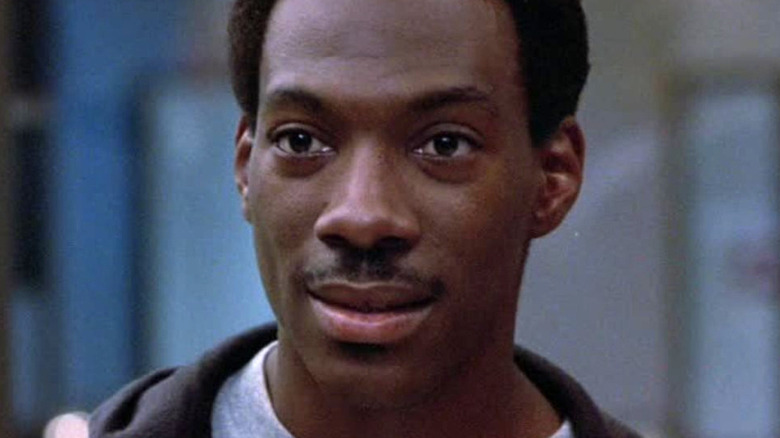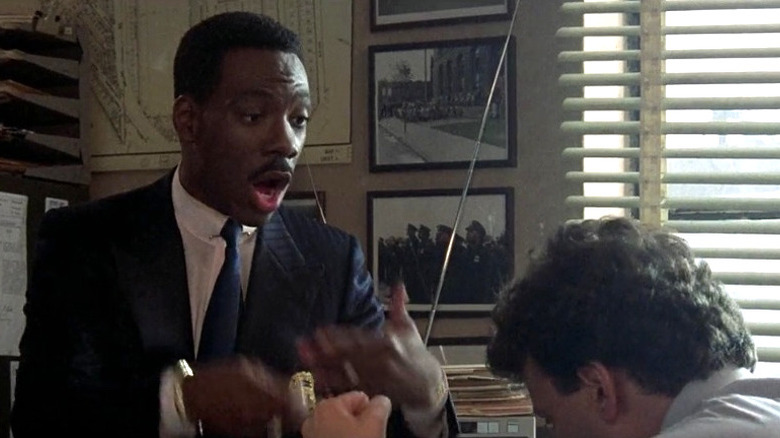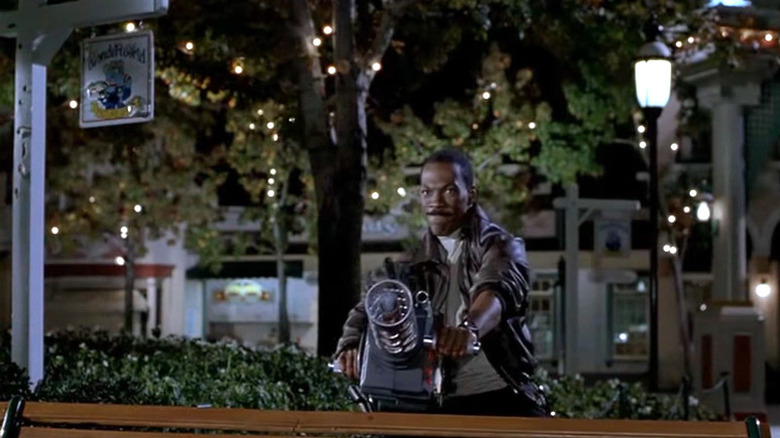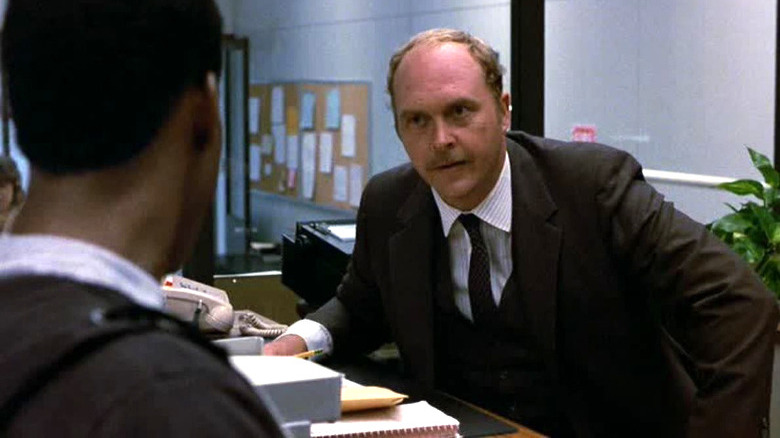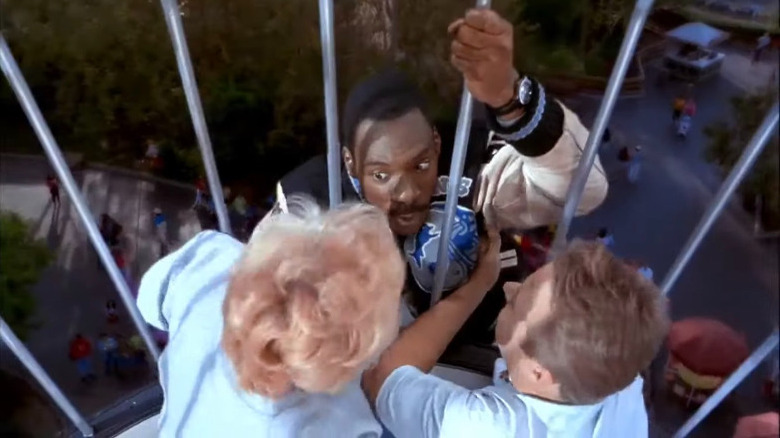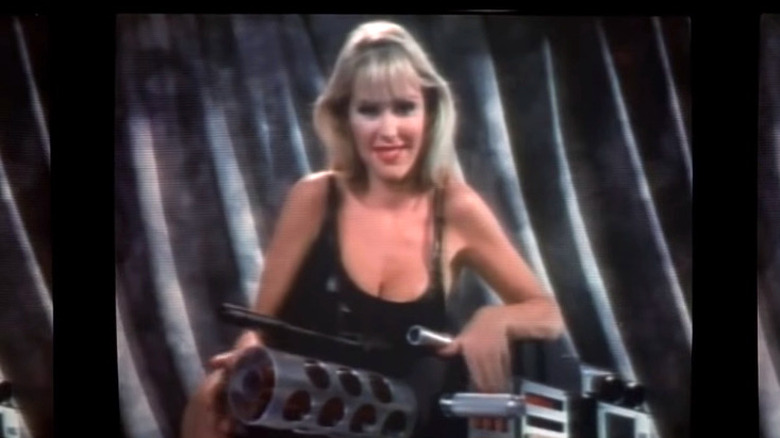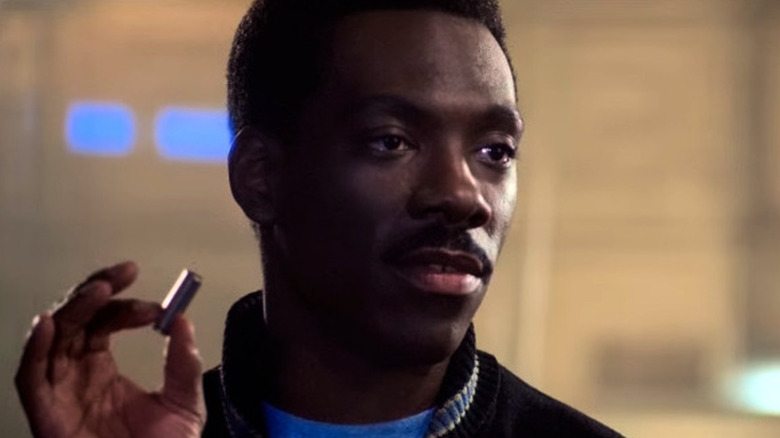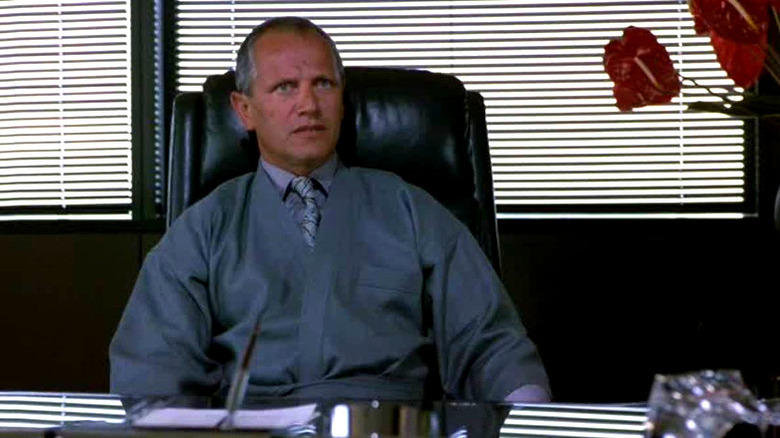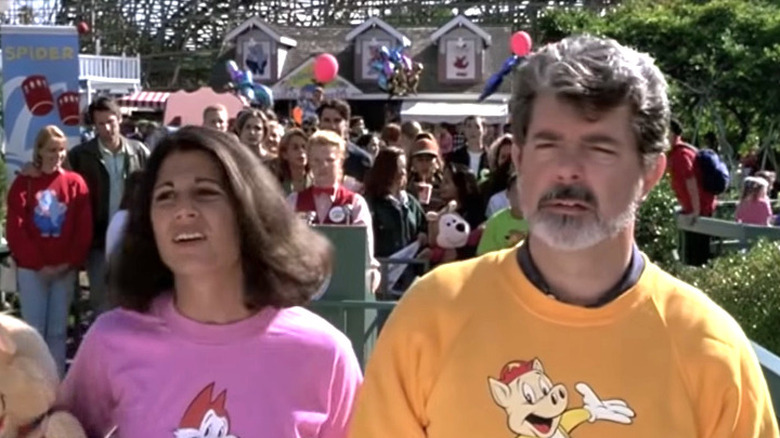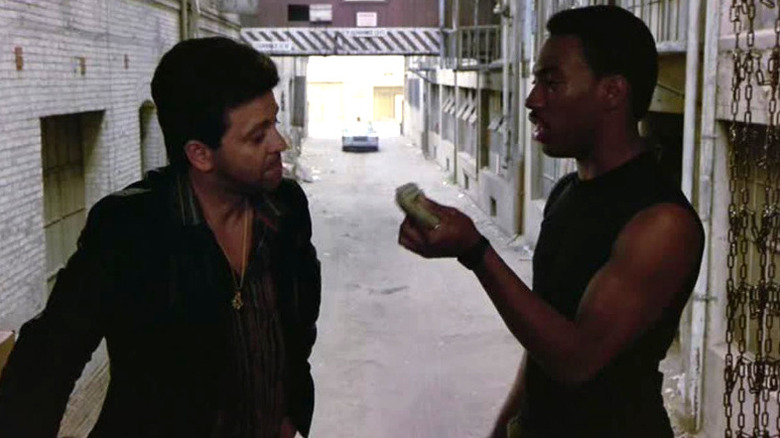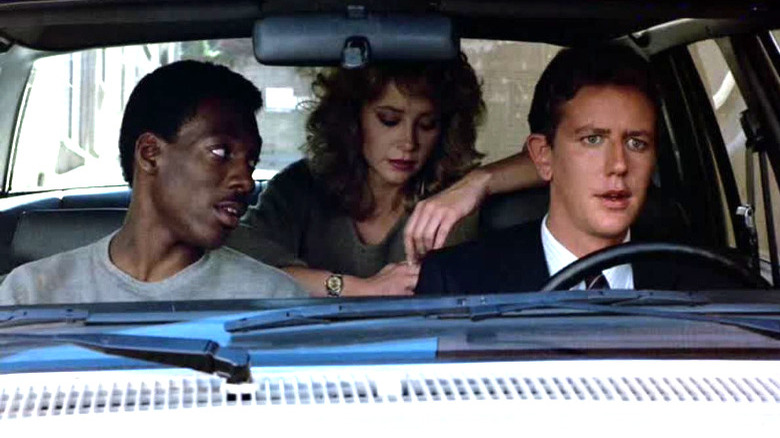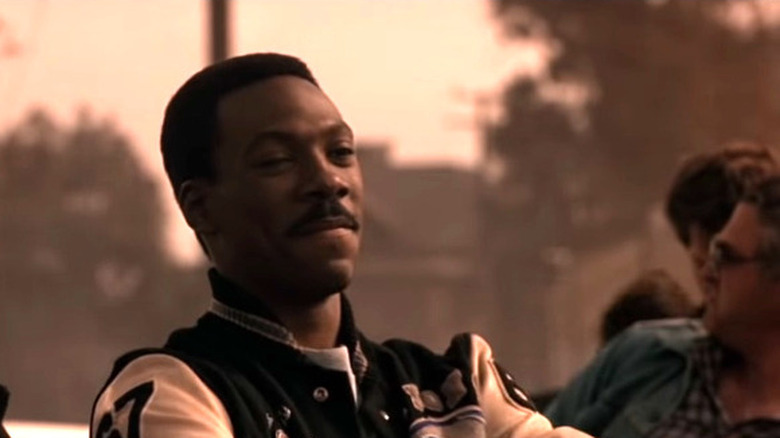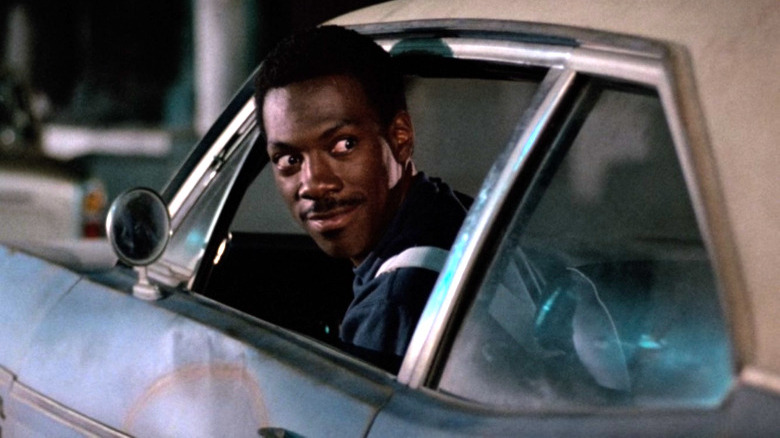Things That Happen In Every Beverly Hills Cop Movie
After making his name as a standup comedian and a rising star on "Saturday Night Live," Eddie Murphy was launched into superstardom with blockbuster films like "48 Hours" and "Beverly Hills Cop." The latter film likely contributed to his status the most since he was the star and didn't have to share the screen with a name as recognizable as Nick Nolte (as was the case with "48 Hours").
The film about a young cop from the gritty streets of Detroit investigating the murder of an old friend on the polished streets of Beverly Hills wasn't only an excellent showcase for Murphy's comedic talent, but his acting chops as well. With its combination of classic cop movie drama, impressive action, and Murphy's quips, the film was such a hit that it spawned two sequels and a reboot (or requel) produced in 2022.
To honor the original action-comedy trilogy, we are highlighting the things that (for better or worse) happen in all of the first three films. Of course, we will be omitting things like car chases and shootouts since that's standard action movie fare. Instead, our focus is on recurring plot elements and story details that pop up again and again.
Axel fails
As is the case with plenty of cop-related action films, Axel Foley is considered to be something of a rebel, someone who doesn't play by the rules. While this ultimately leads to him saving the day thanks to his uncouth methods, it is always introduced as a problem for everyone else around him, especially because every movie starts with him trying to make a big arrest and having it go horribly wrong.
In the first film, Axel's undercover operation gets blown when two cops show up to a deal, and a massive truck chase ensues. In "Beverly Hills Cop II," Axel goes undercover yet again (this time with a nice suit and car) only to have it foiled by the same criminals from the opening of the first film showing up, outing him as a liar. "Beverly Hills Cop III" sees Axel leading a raid on a car garage, only to get more than he bargained for when real heavies show up with serious firepower.
Each failure perfectly sets Axel up for a chance at redemption. He is not perfect at what he does and by showing that fallibility, the stakes are raised for everything that happens later because we know Axel could fail.
Axel's friend gets shot
The premise of the "Beverly Hills Cop" franchise is that a street-wise Detroit cop is temporarily transplanted to the relatively safe and high-class world of Beverly Hills where his "do whatever it takes to get the job done" methods constantly put him at odds with the local police force. Therefore, you need to find a reason to have Axel leave Detroit for the West Coast of the United States.
The first film sees Axel's childhood friend Mikey (who had been doing some work in Beverly Hills) getting assassinated in the hallway of Axel's apartment building in Detroit. Following Mikey's death, Axel heads to Beverly Hills to figure out who he was working for. The sequel has a woman named Karla Fry (played by Brigitte Nielsen) gunning down Axel's friend, Beverly Hills police Captain Bogomil (played by Ronny Cox), as part of a larger scheme, which brings Axel back to California to investigate.
The third film has Axel's boss, Inspector Todd (Gilbert R. Hill) killed during the failed garage raid. Since the killers had ties to Wonder World (a fictional amusement park in Beverly Hills), Axel again heads out West to solve the murder and get revenge.
Axel goes rogue
Each of the cases Axel takes on in the "Beverly Hills Cop" movies is personal to him because of his connection to the victims. Therefore, he is willing to shuck the support of other police officers and risk his job and reputation by investigating the crimes on his own. In "Beverly Hills Cop," Inspector Todd makes it very clear to Axel that if he finds out he is going to Beverly Hills to investigate his friend's murder rather than take his vacation, then he will have him brought up on charges and fired.
The same is true with "Beverly Hills Cop II," except the circumstances are a little different. This time, Axel recruits his coworker Detective Jeffrey Friedman (played by Paul Reiser) to cover for him while he's away, even asking him to pose as Todd when the Beverly Hills police call his precinct back in Detroit. This isn't quite as prominent in "Beverly Hills Cop III," but it does exist to a certain extent.
That time, instead of risking his job back in Detroit, Axel risks everything to publicly confront the villain of the film, making him a (temporary) enemy of the local police force and the feds as the Secret Service is also (sort of) investigating what's going on at Wonder World and sees his actions as a hindrance.
Red tape
The real antagonist in all of the "Beverly Hills" cop movies isn't the villains smuggling drugs, weapons, or counterfeit money — it's the rule of law. If Axel Foley had his way, he'd stroll up to the bad guys and either haul them away in cuffs without any evidence for the arrest or simply blow them away where they stood to make them pay for shooting his friends. Unfortunately for him, laws prevent that kind of vigilante justice.
In the first film, officers William Rosewood (Judge Reinhold) and Taggart (John Ashton) are tasked with tailing Foley to make sure he doesn't break any laws. He wins them over by the end, but "Beverly Hills Cop II" has another (less interesting) duo trying to watch his every move as well. Luckily, Rosewood and Taggart are still on his side and help him wiggle his way out of trouble whenever they can. Plus, there's a new chief keeping all his officers on a tight leash.
Rosewood gets a promotion and Taggart retires by "Beverly Hills Cop III," so it's up to Héctor Elizondo's Detective John Flint and Secret Service Agent Fulbright (Stephen McHattie) to try and keep him in line, even if the latter has ulterior motives.
Clinging on for dear life
Axel Foley isn't James Bond or even John McClane, but he is an action hero of his own kind, so he is occasionally forced to perform death-defying stunts in each movie. The original film began with Axel doing business in the back of a truck full of stolen cigarettes when the cops show up. The chase that follows sees Axel holding onto the back door as it swings out of control while the truck charges its way like a freight train down a Detroit street.
In "Beverly Hills Cop II," Rosewood steals a truck to chase down the villains and Axel has to grab onto it as it speeds by. He hangs to the passenger door before pulling himself into the seat. "Beverly Hills Cop III," takes advantage of its amusement park setting by staging an accident with one of the rides called The Spider. Axel flees onto the ride to escape some violent security guards, but they force it to break down.
This puts the lives of a pair of kids at risk. To save their lives, Axel climbs onto the various cars on the ride and leaps to each one. He eventually uses a rope to safely get the kids back to the ground just as their car crashes below.
Objectification
There are certain '80s movie tropes that are nearly impossible to avoid. Perhaps the one that transcends genre is the exploitation and objectification of women. The "Beverly Hills Cop" franchise is just as guilty as any other. At some point in film history, someone decided that when people need to talk about crime, it should take place in a strip club, and the first two "Beverly Hills Cop" movies maintain that tradition.
The first film is the worst offender as there's no real reason for Axel to take Rosewood and Taggart to the strip club other than to try and get them to loosen up a little. Of course, a crime breaks out and the three cops are there to foil it, thus solidifying their friendship, but that was a happy accident. At least "Beverly Hills Cop II" has a reason for them to be in that club since it is owned by the man they're investigating.
However, later in the movie, they visit the Playboy mansion and there is a 100% superfluous Playmate volleyball sequence that serves no purpose (although it is remarkably similar to director Tony Scott's other famous volleyball scene from "Top Gun"). The third movie uses the objectification of women as satire by making models in increasingly ridiculous states of undress model a new, phallic machine gun.
Axel knows more
An element of "Beverly Hills Cop" which is embedded in the concept but never openly discussed is the fact that Axel's history as a young criminal, and the fact that Detroit doesn't have the same resources as Beverly Hills, makes him more observant and able to think outside of the box. Usually, this dichotomy is played for laughs, but each movie also features a clue that Axel spots but everyone else misses.
In the original film, it's the use of coffee grounds. While investigating a warehouse, he finds coffee grounds spilled in one location. No one else cares, but he knows that coffee grounds are often used in drug smuggling because it throws dogs off the scent. It's a bullet shell in the sequel. While the rest of the police department is stuck dealing with politics and trying to figure out how these robberies and murders are connected, Axel notices the bullet shell came from a specific manufacturer.
With "Beverly Hills Cop III," Axel stumbles into the counterfeit money scheme when he finds the torn-off corner of a 50-dollar bill. Nobody else realized that it would have ink spilled on it if it were legitimate, but this signals to him that someone at Wonder World might be printing fake money.
Wealthy villains
The everyman vs. the elite motif carries through every "Beverly Hills Cop" movie with Axel continuously facing off against wealthy villains who believe they're untouchable. The first villain is an influential art gallery owner named Victor Maitland (Steven Berkoff) who also smuggles bonds and drugs on the side. Axel confronts him early in the second act, but gets thrown out of the window and subsequently arrested for his trouble.
Axel's second foe is Maxwell Dent (played by Jürgen Prochnow), a wealthy businessman who is stealing from himself to pay for arms dealing. When Axel confronts him at the Playboy mansion both he and Dent are removed from the premises, letting Dent know that he isn't as untouchable as he thinks he is. Axel faces off against a criminal a little more like him in the third film as Ellis DeWald (Timothy Carhart) used to be a cop before making his fortune in private security.
The message across the board is clear: Money may make you powerful, but it doesn't make you untouchable.
Surprising cameos
While it's likely unintentional with the first film, the sequels feature cameos from people whom you might not expect to show up in an action comedy. One of the iconic scenes in the original film is the moment when Axel stuffs bananas in the tailpipe of Rosewood and Taggart's car so they won't be able to follow him. The hotel employee who gives him the bananas was played by Damon Wayans.
Chris Rock has a cameo in "Beverly Hills Cop II" as a furious employee of the Playboy mansion. Speaking of Playboy, while Axel confronts Maxwell Dent during the Playboy party, the man who shows up to inform them they have to leave is none other than Hugh Hefner himself. Director John Landis threw a bone at his other director and filmmaker buddies by having a bunch of them cameo in "Beverly Hills Cop III."
Joe Dante (director of "Gremlins") plays a cop, Arthur Hiller ("Love Story"), John Singleton ("Boyz n the Hood"), Barbet Schroeder ("Barfly"), and Peter Medak ("The Changeling") all make appearances, as do stop-motion legend Ray Harryhausen ("Jason and the Argonauts"), and songwriter Robert B. Sherman. Perhaps the most surprising, however, is "Star Wars" creator George Lucas as an angry amusement park patron.
Axel lies
Since the law is the most prominent antagonist in all the "Beverly Hills Cop" films, it makes sense that Axel Foley would have to resort to lying in order to achieve his goals. From the moment we meet him, he's lying to someone. At first, that's because he's working undercover, even though he was never explicitly given permission to launch his own undercover investigation. Then he lies to his superiors, telling them he's going to take a vacation rather than look into his friend's murder.
While in Beverly Hills, he lies to fellow police officers constantly in addition to the various low-level workers he encounters on his investigation. The same is true in the sequel, where Axel even pretends to be delivering explosive material to someone so the woman at the door will give him the information he needs without asking too many of her own questions.
He doesn't lie as much in the third film, but there are a few examples peppered in the action, like saying he is inspecting The Spider to justify cutting the line and ruining George Lucas' day by making him wait when he was next in line.
Axel is ordered to leave
By the third act of every "Beverly Hills Cop" movie, the brass becomes so fed up with Axel's antics that they order him to leave the city immediately. In the first film, Rosewood and Taggart are ordered to escort Axel outside the city limits and he's informed that all his crimes will be forgiven as long as he never steps foot in Los Angeles County ever again. He, of course, fails to comply and even convinces Rosewood and Taggart to help him take on Victor Maitland.
Almost the same exact scenario plays out in "Beverly Hills Cop II" when he is about to be escorted out of the city limits, except Rosewood shows up with a cement truck to help him out. Then, they launch a raid where Dent is having his guns shipped in and a massive shootout takes place. Things shift a little bit in "Beverly Hills Cop III" as it isn't the local police department kicking him out — it's the Secret Service.
Agent Fulbright thanks Axel for his help, but gives him a ticket back to Detroit, saying he's done enough but Axel has to let him do his job. This is a ruse, however, and he's actually trying to get rid of Axel because he is so close to exposing the counterfeit money scheme that he is participating in.
The ends justify the means
Action movies (especially '80s action movies) exist in a borderline comic book universe where the hero can accomplish incredible feats without having to spend the rest of their lives in therapy or in a medical facility or in jail. The same is true with "Beverly Hills Cop," since no matter how many laws Axel Foley breaks, he is always the hero at the end of the day.
At the end of the original film, Rosewood and Taggert agree to lie to their superiors in order to make sure that all of their illegal activities do not result in any disciplinary action. In the second film, the mayor points out that he doesn't care how Axel and his buddies got the job done as long as the danger posed by Dent is no longer a concern for the city. He even fires the current police chief who had been trying to maintain order.
Axel is such a hero at the end of "Beverly Hills Cop III" that a new Wonder World character is created in his honor, despite all the chaos and bloodshed caused by his reckless actions.
Freeze frame
Once the crime has been solved and the bad guys punished, it's time for Detective Axel Foley to pack his bags and head back to Detroit. Before leaving though, he has to provide the audience with some closure by letting us know that everything's going to be okay, and nothing says that better than a freeze frame of a smiling face.
At the end of "Beverly Hills Cop," Rosewood and Taggart are tasked with tailing Axel out of the city. He asks if they'll stop and have a drink with him. After agreeing, they ask where they're going. Axel tells them not to worry about it and promises they will love it, before delivering a mischievous smirk. In the sequel, Axel leaves Taggart and Rosewood with the keys to the house he'd been squatting in as the angry owners return from vacation. As they realize his stunt, he turns back and grins.
Wonder World founder Uncle Dave introduces the Axel Fox character in honor of Axel's heroics at the end of the third film. Foley is then wheeled away by his pseudo-love interest Janice (Theresa Randle) who promises to show him the Tunnel of Love (which is a euphemism). Before leaving the frame, he turns to us and gives us a knowing smile.
